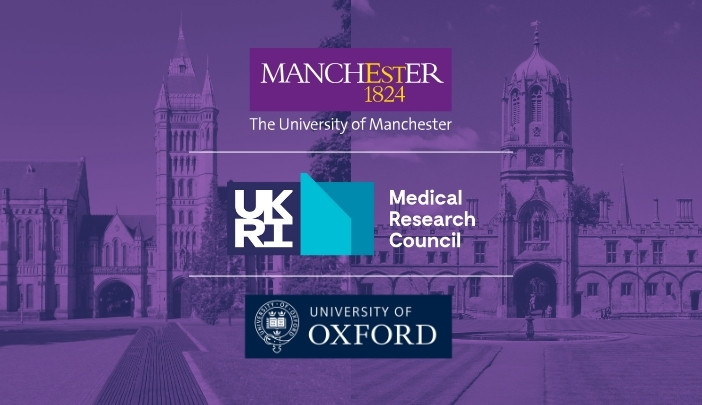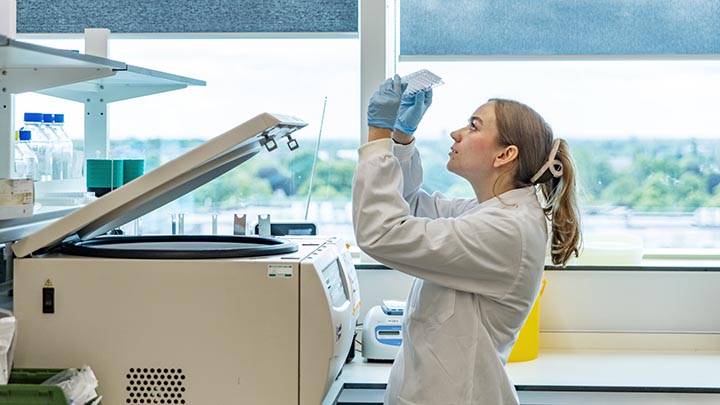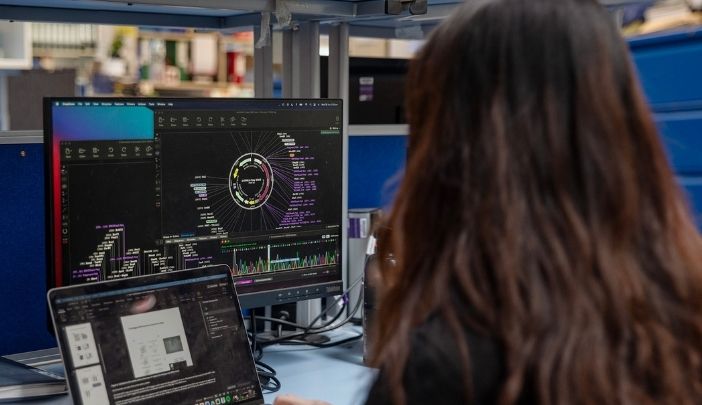Explore how environmental exposures cause chronic inflammatory diseases
Fully funded PhD studentships
The Medical Research Council (MRC) Centre of Research Excellence (CoRE) in Exposome Immunology is a pioneering research programme that explores how environmental exposures at mucosal barriers shape the immune system and drive inflammation.
Our changing global environment has increased exposure to infectious agents and pollution, contributing to a worldwide rise in chronic inflammatory diseases (CIDs) including asthma, chronic obstructive pulmonary disease (COPD) and inflammatory bowel disease (IBD).
This fully funded four year PhD programme brings together the Medical Research Council (MRC), The University of Manchester and University of Oxford to understand how environmental exposures regulate the immune system and to prevent and treat CIDs.
Applications are now closed for 2026/27 entry.
About the programme
The MRC CoRE in Exposome Immunology initiative combines world-leading expertise in lung and gut barrier immunity, exposome science, and immunological mechanisms, with access to outstanding facilities, bespoke training, and a supportive research culture at Manchester and Oxford.
You’ll have the freedom to explore your own interests and shape your research journey, supported by world-class supervisors from both institutions in a collaborative cohort of researchers addressing one of the most pressing global health challenges.

Why apply for the MRC CoRE in Exposome Immunology?
Research themes and supervisors
Six studentships were available for 2026/27 entry.
Applications are now closed for 2026/27 entry.
Discover more about each of the programme's research themes and supervisors linked with each theme.
Before applying, you will need to decide which institution you’d like to apply to. On your application form you’ll need to state the research topics you’re interested in and up to three supervisors you’d like to work with.
Candidate students will be in the perfect environment to study how different exposures affect people of all ages, from children to adults. They’ll examine how specific exposures, like viral infections, smoking, and pollution, impact human health.
The diverse factors that influence how the exposome regulates immunity and disease will generate high volume, high-dimensional, heterogeneous data across biomedical, health, and environmental sciences. We will use machine learning approaches combined with mathematical modelling to formalise hypotheses and propose new experiments with results feeding back into improved computational models and further experimental cycles. We will build capacity within the CoRE by working closely with AI and mathematical modelling across centres of excellence in UoM and UoO.
Data and techniques
- machine learning and artificial intelligence;
- computational biology and bioinformatics;
- multi-omic integration (transcriptomics, proteomics, epigenomics, metabolomics);
- single cell and spatial analysis;
- microbiota characterisation;
- TCR/BCR sequencing;
- multiplex tissue imaging.
Immune interactomes identified above will generate further mechanistic studies to identify how immune pathways interface across physiological systems to drive maladapted responses to the exposome. We will harness cross-institutional strengths in infection biology, neurobiology, metabolism, and ECM biology to identify cellular and molecular pathways through which exposome signals alter immunity at barrier sites and are communicated to distal tissues using and offering training in a range of techniques, including:
- human organotypic;
- organ-on-a-chip and tissue slice models;
- disease positioned and defined microbiome studies;
- advanced tissue imaging (intra-vital, light sheet, spatial transcriptomics) and metabolomics;
- proteomics and matrisome analysis.
Prioritised mechanistic pathways emerging from biological and computational models will be progressed to human challenge and proof-of-mechanism studies building on established clinical infrastructure across the network. Ongoing studies including prebiotic and probiotic dietary interventions, bacterial metabolite supplements, antigen and vaccine human challenge and pre- and post-therapy sampling in CIDs will provide human in vivo datasets for immediate interrogation of exposome-driven pathways.
Eligibility
Entry requirements
Competition for studentships is expected to be high.
These studentships are available to UK and international applicants, and provide funding for tuition fees and stipend at the UKRI rate.
Applicants must have obtained, or be about to obtain, a First or Upper Second class UK honours degree, or the equivalent qualifications gained outside the UK, in an appropriate area.
We seek to create equality of opportunity for all our applicants and postgraduate researchers. Find out more about equality, diversity and inclusion at Manchester.
.png)
How to apply
Step-by-step guide to applying
Applications are now closed for 2026/27 entry.
Want to be considered for an MRC Centre of Research Excellence in Exposome Immunology PhD Programme studentship?
Find out what you need to do before you apply and how to apply with our step-by-step guide.
Ensure you meet the entry requirements for this programme.
If you’re eligible and want to apply for the programme decide whether you want to apply via The University of Manchester or the University of Oxford. Applicants can only apply to one.
Applicants interested in applying to Oxford should visit their website.
Browse the list of research themes and supervisors available for 2026/27 entry and select up to three supervisors you’re interested in working with.
Once you have found your research theme and supervisors, you can apply online using the following information:
- Level of study: Postgraduate Research
- Entry year: 2026/27
- Academic programme: MRC CoRE in Exposome Immunology
- Intake: September
For the funding section you should select:
- Funding: 'Yes' from the drop-down
- Type of funding: 'Research Council'
- Awarding body: MRC
- Status of funding: Awarded
- Funding covers: Fully Funded
- Leave the remaining boxes blank
Please note that applicants interested in applying to Oxford should visit their website.
After you’ve applied, your application and the supervisors you’ve selected will be reviewed by our panel.
The panel will assess applications and invite potential candidates to interview.
Key dates for 2026/27
Dates for your diary
- Applications open: Tuesday, 9 September 2025
- Application deadline: Tuesday, 2 December 2025
- Interviews take place: January 2026

Keep up-to-date
Sign up for updates
Be the first to hear about funded programmes and funding opportunities when they launch.
You’ll receive our monthly newsletter for prospective applicants which includes updates on featured projects, our latest events and application tips.

Contact us
Have any questions? Get in touch.
If you have any questions about our MRC Centre of Research Excellence in Exposome Immunology PhD Programme contact our Doctoral Academy admissions team.







.png)